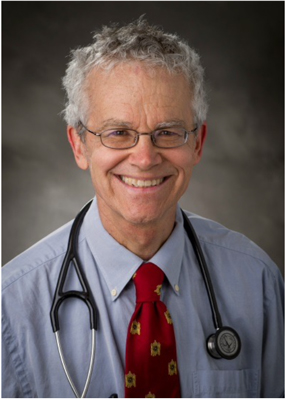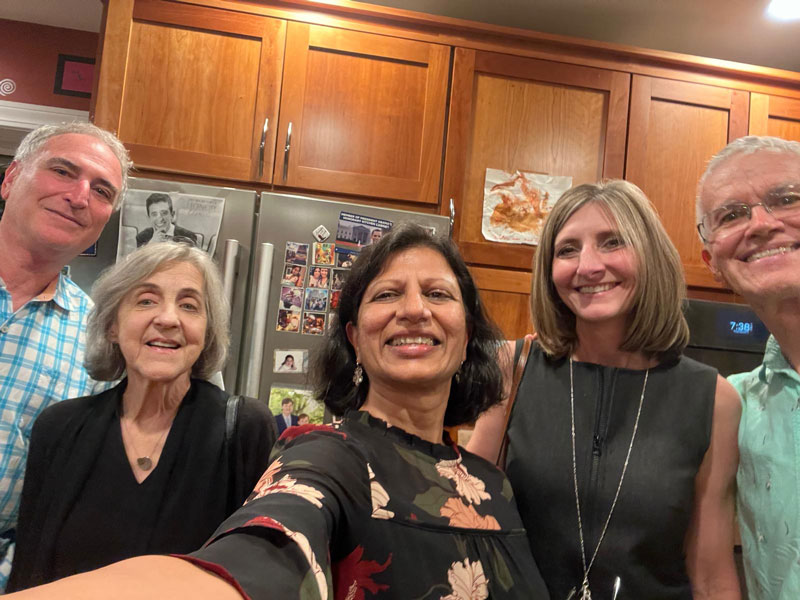Instead of sitting in Chicago traffic, this pediatric cardiologist bikes the 25-mile round trip to work. Rain or shine — or snow
 Guided by a dim light on the handlebars of his KHS Urban commuter bike, 67-year-old Dr. David Thoele leaves his Chicago home around 6 o’clock, no matter how cold, dark, rainy, icy or snowy. He pedals the 12-plus miles it takes from the front door of his home near Wrigley Field to Advocate Lutheran General Hospital in Park Ridge, then another 12-plus miles going back home.
Guided by a dim light on the handlebars of his KHS Urban commuter bike, 67-year-old Dr. David Thoele leaves his Chicago home around 6 o’clock, no matter how cold, dark, rainy, icy or snowy. He pedals the 12-plus miles it takes from the front door of his home near Wrigley Field to Advocate Lutheran General Hospital in Park Ridge, then another 12-plus miles going back home.
A pediatric cardiologist and co-director of Narrative Medicine Group at Advocate Children’s Hospital/Advocate Lutheran General Hospital, he dons a helmet, reflective cycling gear and Bluetooth to attend 7 a.m. ZOOM meetings enroute.
His job requires a remarkable amount of stamina and presence, to counteract the stress and emotion he experiences caring for seriously ill infants and children.
Exercise and self-care keep him sane, he says. But both require time—a physician's scarcest resource. With packed schedules and the pressures of modern medical practice, Dr. Thoele fits a little “me time” into his daily routine, which speaks volumes about his commitment to walking the walk,(or in this case pushing the pedals) to improve the physical and mental health of his patients and their caregivers.
“Why not?” Dr. Thoele typically responds with a smile and a shrug when healthcare peers and others ask him if he actually rides his bike to work every day. “Is there another way to get here?”
Modeling good lifestyle and healthy living habits is just the first leg of his physician journey to care for, heal and guide his patients to live fully in the face of often serious illness.
Lights, Camera... Storytelling: the Secret to Healthy Living
Through the Advocate Health Narrative Medicine Group he co-founded with Marji Getz, PhD, in 2013, Dr. Thoele is passionate about the healing power of writing for patients, physicians and caregivers. He first discovered the power of the pen when his adult daughter was a child with some medical challenges, and he experienced the medical system from a parent’s perspective.
To help his patients, he developed a short writing exercise, the 3-Minute Mental Makeover (3MMM), for doctors to use with their patients. He and his group published studies in The Permanente Journal that showed that the 3MMM reduced stress for patients, families and health practitioners, and led to other benefits including more compassionate and empathetic care. Dr. Thoele and his 3-Minute Mental Makeover were recently featured on the WBBM | CBS Chicago TV feature. He’s worked with hundreds of patients, their families and healthcare professionals with his transformative way to change your day in three minutes or less.
– Dr. David Thoele, Pediatric Cardiologist & Co-Director of Narrative Medicine Group
Take Up a Pen and Journal and Call Me in the Morning
Both a writer and speaker, Dr. Thoele has led writing workshops at The Examined Life Conference in Iowa City, the International Health Humanities meeting, the Accreditation Council for Continuing Medical Education, and the National Association of Pediatric Nurse Practitioners. His creative essays are featured in Pulse, Hektoen International, Ars Medica, and Physicians Practice. He says he first became interested in narrative medicine because writing and journaling “helped me understand, process and cope with illness and sometimes death in children with heart disease.” His writings and videos can be found on his YouTube channel, “DrDave - YouTube.”
“This has helped me become a better doctor and has also lowered my own stress,” says Dr. Thoele. He has led over 8000 people in the writing exercise, and over 10,000 people in his breathing exercise, Dr. Dave’s Deep Breathing. Both the 3MMM and the breathing exercise are available on his YouTube channel and also through the hospital system’s free LiveWell application. The benefits of the 3MMM are immediate, says Dr. Thoele:
- Lowers stress levels
- Increases communication
- Improves healthcare providers’ understanding of patients’ emotional needs
- Leads to more empathetic delivery of care
He adds, “narrative medicine—the practice of telling and receiving stories—helps me listen better to my patients and tell my own story. When we become partners, my patients and I work together to treat problems and build health.”
 “I believe storytelling is related to health because I have experienced the healing power that comes when a patient of mine tells me her story: I take in that story, and together we create a plan of action that can work for that particular situation,” he says. “Some of my patients have been to multiple doctors who didn’t take the time to listen, so the underlying cause wasn’t identified and the problem wasn’t addressed. Listening to stories takes a bit of time, but in my opinion, this is a more efficient way of providing health care for my patients. Many of my patients have told me that writing in the journals we provide has helped them tremendously.”
“I believe storytelling is related to health because I have experienced the healing power that comes when a patient of mine tells me her story: I take in that story, and together we create a plan of action that can work for that particular situation,” he says. “Some of my patients have been to multiple doctors who didn’t take the time to listen, so the underlying cause wasn’t identified and the problem wasn’t addressed. Listening to stories takes a bit of time, but in my opinion, this is a more efficient way of providing health care for my patients. Many of my patients have told me that writing in the journals we provide has helped them tremendously.”
Since its beginning, Drs. Thoele and Getz met with the Advocate Narrative Medicine Group in person, and now they meet on ZOOM on the first and third Tuesdays of every month from 8 to 9 AM CST. To join, email
“Our meetings provide an opportunity to practice the art of observing various art forms and respond in writing narrative and other media, listening to others’ stories, and quietly reflecting,” says Dr. Thoele. The more than 500 members include nurses, doctors and other healthcare providers; Advocate associates, as well as artists, caregivers, community members, educators, film makers, librarians, medical students, patients, professors, residents, social justice activists, writers, and others.
Drs. Thoele and Getz also led the Advocate Narrative Medicine Group to form a strategic partnership with The Art Institute of Chicago. This represents a groundbreaking model that extends beyond conventional patient care. Doctors and healthcare staff along with members of the larger Narrative Medicine group take field trips to study and reflect on art at the downtown museum. By integrating themes of identity, equity, and resilience, this alliance gives voice to vulnerable populations and expands the scope of narrative medicine into community settings. It marks a significant advancement in blending the arts and humanities with healthcare, fostering empathy, understanding, and holistic well-being for both individuals and the community.
“For me personally, using the art of narrative medicine has helped me dig deeper and examine more closely what is happening to connect better with people in a variety of situations,” says Dr. Thoele.
The Mindworks Questionnaire
- What is your idea of perfect happiness?
Spending the day riding my bike, seeing patients, and going to a yoga class
- Which living person do you most admire?
Anthony Fauci
- What do you consider your greatest achievement?
The 3-Minute Mental Makeover: Creating it, implementing it with my patients, studying it, and teaching others to use this as part of writing and reflection practice.
- Who are your favorite writers?
Charles Dickens , David McCullough, Atul Gawande, Joyce Kearns Goodwin, Jill Lepore, Abraham Verghese
- Describe yourself in six words.
Curious, enthusiastic, reliable, cardiologist, talker, relationships
- What are you most grateful for?
My wife and my daughter
- What’s next on your bucket list?
I would love to travel the world teaching people in challenging situations (doctors, nurses, refugees) how to use the 3MMM to help people connect and be less stressed.

